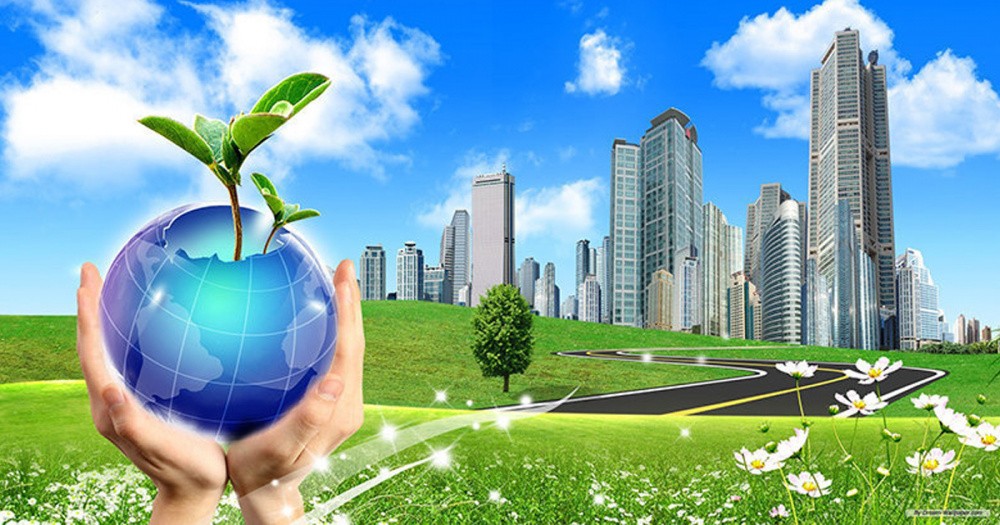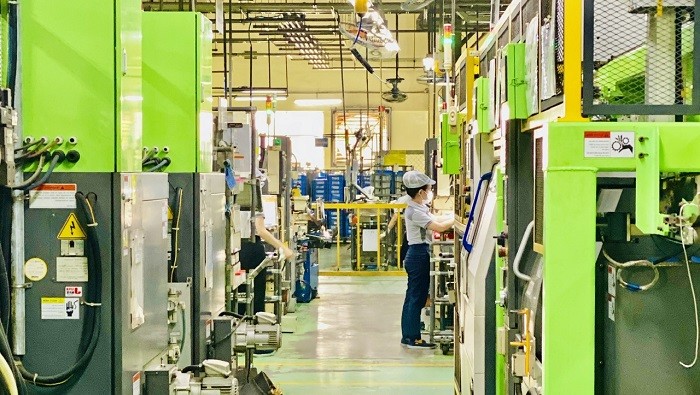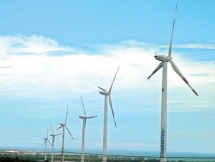Green Economic Development in Vietnam - Achievements and Issues
| Vietnam, EU to Implement Digital Transformation For Sustaining Green Economy | |
| Green Economic Cooperation Connects Ho Chi Minh City with Australia |
 |
| In Vietnam, green growth and sustainable development have received special attention from the Party and State in recent times. |
The concept of Green Economy was officially used at the United Nations Summit on Sustainable Development in June 2012 in Rio de Janeiro, Brazil. According to UNEP (United Nations Environment Program), the connotation of Green Economy includes basic elements: Low carbon emissions; efficient use of resources; and ensuring social equity.
Consistent policy and strong commitment to green economy of the Party and State
In Vietnam, green growth and sustainable development have received special attention from the Party and the State in recent times.
Since 2012, the Government has issued Decision No. 1393/QD-TTg approving the National Strategy on Green Growth for the 2011-2020 period and vision to 2050 with three strategic tasks: First, reducing the intensity of greenhouse gas emissions and promoting the use of clean energy and renewable energy; Second, greening production; Third, greening lifestyles and promoting sustainable consumption. The National Strategy on Green Growth is an important legal basis.
The Resolution of the 13th National Congress of the Party affirmed: “Continue to develop the country rapidly and sustainably, ensure macroeconomic stability, strongly innovate the growth model, improve productivity, quality, efficiency and competitiveness of the economy. Proactively and effectively adapt to climate change, manage, exploit, use resources rationally, economically, effectively and sustainably; take protecting the living environment and people's health as the top goal; resolutely eliminate projects that cause environmental pollution, ensure the quality of the living environment, protect biodiversity and ecosystems; build a green economy, a circular economy, and be environmentally friendly”.
On October 1, 2021, the Prime Minister issued Decision No. 1658/QD-TTg approving the National Strategy on Green Growth for the 2021-2030 period, with a vision to 2050. Accordingly, the Strategy sets the goal of transforming the growth model towards greening economic sectors, applying a circular economic model through the exploitation and economical and efficient use of natural resources and energy based on science and technology, applying digital technology and digital transformation, developing sustainable infrastructure to improve growth quality, promote competitive advantages and minimize negative impacts on the environment.
Accordingly, the goal is to reduce the intensity of greenhouse gas emissions per GDP; strive to reduce the intensity of greenhouse gas emissions per GDP by at least 15% compared to 2014; By 2050, the intensity of greenhouse gas emissions per GDP will be reduced by at least 30% compared to 2014.
Resolution No. 29-NQ/TW dated November 17, 2022 of the 13th Party Central Committee on continuing to promote the country's industrialization and modernization to 2030, with a vision to 2045, has identified the key content of the industrialization and modernization process in the 2021-2030 period as promoting the digital transformation and green transformation of industries and fields.
At the Plenary Session of the High-level Forum and Exhibition on Industry 4.0 in 2023 on June 14, 2023, Prime Minister Pham Minh Chinh emphasized that the Party and State of Vietnam attach great importance to and consider digital transformation, green transformation and sustainable development as key tasks in the industrialization and modernization process. The Vietnamese Government pledges to actively accompany and cooperate with countries and international organizations to strongly promote digital transformation, enhance green growth, and strongly promote the 4.0 industrial revolution to bring peace and common prosperity to peoples around the world.
At the 26th Conference of the Parties to the United Nations Framework Convention on Climate Change (COP26), Vietnam pledged to develop and implement strong measures to reduce greenhouse gas emissions using its own resources, together with the cooperation and support of the international community to strive to achieve net zero emissions by 2050.
 |
| Investment in green industry and green energy projects is given attention. |
Vietnam's outstanding achievements
Looking back over 10 years of implementing green economy according to the orientation and policies of the Party and State, Vietnam's economy has made remarkable progress: From 2011 to 2021, Vietnam's economic growth rate reached an average of 5.65%. Although in 2020 and 2021 it only reached 2.87% and 2.55% due to the impact of the Covid-19 pandemic. However, 2022 recorded a strong recovery of Vietnam's economy with a growth rate of 8.12%. In 2023, the GDP growth rate in 2023 only reached 5.05%, not achieving the set target but also a great effort in the context of a very difficult global economy, helping our country's economy to be among the countries with high growth in the world.
Regarding the economic structure in 2023, the agriculture, forestry and fishery sector accounts for 11.96%; the industry and construction sector accounts for 37.12%; the service sector accounts for 42.54%; product taxes minus product subsidies account for 8.38% (The corresponding structure in 2022 is 11.96%; 38.17%; 41.32%; 8.55%). Compared to previous years, Vietnam's economic structure in 2021 has shifted in a positive direction, increasing the proportion of industry and services, gradually reducing the proportion of agriculture, forestry and fishery. This trend clearly demonstrates the orientation of green economic development of the Party and State of Vietnam.
To achieve initial achievements in the goal of greening the economy, the Government and the Prime Minister have had many policies and solutions to support and promptly remove difficulties in policies and institutions to support businesses in the face of fluctuations in the export market. In addition, businesses are encouraged to approach and apply green agriculture models, develop green industry, develop renewable energy and save energy, reduce CO2 emissions for heavy industries, etc.
Supporting and accompanying Vietnam's transition to a green economy, in recent times, the World Bank has actively supported Vietnam in many areas, especially capital investment in projects on green industry, green energy, infrastructure development, urban environmental management and climate change response. Since 1994, the World Bank has committed to supporting Vietnam with more than 25.3 billion USD (The World Bank, 2022).
Vietnam's labor structure has a clear tendency to shift towards non-agricultural sectors. This trend is consistent with the goal of greening the economy, contributing to supplementing and developing high-quality human resources to serve socio-economic development goals.
Challenges of Green Economic Development in Vietnam
It can be seen that the Party and State's policies on green transformation are clear, with a well-planned roadmap and strong determination. At the same time, Vietnam's economy is also strongly transforming towards green. However, Vietnam's sustainable development and commitment to achieving net zero emissions by 2050 are also facing significant challenges. These are:
- Factors such as natural disasters and climate change are becoming increasingly fierce, complex, and unpredictable, the level of science and technology development is still low; negative impacts from fluctuations, geopolitical conflicts, post-Covid-19 crises... from outside while our country's economy is highly integrated.
- Some businesses' awareness of the green economy is still inadequate. They even hesitate, citing financial difficulties as an excuse to delay green transformation.
- Resources for the goal of greening Vietnam's economy are still quite limited. In addition, fluctuations, geopolitical conflicts, economic crises, and fierce competition in the world market are posing many challenges to Vietnam's macroeconomic stability.
- The labor force serving the green economy requires a high level of science and technology. This is a problem that we have recognized early on, but the level of resolution is not satisfactory. In addition, the production chain and technology in Vietnam are mostly old and outdated technology, consuming a lot of fuel and energy.
- The legal system is still not really synchronized, there are no specific legal documents regulating green energy and renewable energy; it is necessary to issue new laws on industrial development and environmental protection... In addition, the management of the implementation of the green economic development strategy in sectors, regions, and localities across the country is not really linked and unified with each other.
Several solutions for green and sustainable development
From the practice of green economic development in Vietnam and international experience, according to experts, to achieve the goals set by the Party and the State and strongly develop the green economy in "Vietnam's rising era", it is necessary to focus on the following solutions:
First, perfecting institutions and reforming administrative procedures; especially the policy system on green economic development to facilitate businesses to enter the green economy and benefit from this model. Building a green economic structure with three pillars: agriculture - industry - services adapting to climate change. Applying information technology in forecasting and overcoming environmental incidents; building a mechanism for reporting and responding quickly to the environment; amending and supplementing sanctions to handle business activities that harm the environment. At the same time, it is necessary to strengthen the monitoring and enforcement of regulations fairly and transparently, reduce barriers and complicated procedures, and simplify administrative processes.
Second, the Government needs to have reasonable and attractive mechanisms and solutions to call for the mobilization of domestic resources to develop and apply high technology, especially in the fields of production and export to meet the requirements of the international market - paying attention to regulations on environmental pollution and climate.
Third, gradually incorporate green development and sustainable development into education programs at all levels; promote communication activities and propaganda campaigns to raise public awareness. At the same time, allocate adequate resources for investment in research and development of green technology.
Fourth, mobilize international support to achieve national green development goals. This is the basis for small and medium-sized enterprises to ensure financial liquidity in the supply chain, helping to support capital for green infrastructure projects. In addition, it is necessary to create favorable conditions for large-scale and modern investment projects that meet environmental, social, and governance standards; as well as learn from green development experiences of advanced countries to apply in Vietnam.
| According to the 2023 edition of the Green Growth Index, Vietnam ranked 73rd out of 245 countries in the world and 16th out of 50 countries in Asia, with an index score of 56.44. According to the 2023 edition of the Green Future Index, Vietnam ranked 53rd out of 76 economies and 9th out of 16 economies in Asia, with a score of 4.13. |
 | The green economy needs the right kind of FDI: gov't The government, recently reviewing 25 years of (1988-2012) FDI, has decided that Vietnam needs to attract low-carbon FDI and develop a green economy. A national ... |
 | Vietnam, EU to Implement Digital Transformation For Sustaining Green Economy "The European Union (EU) is ready to cooperate with Vietnam to overcome challenges towards green growth," said the EU Ambassador to Vietnam Pier Giorgio Aliberti ... |



